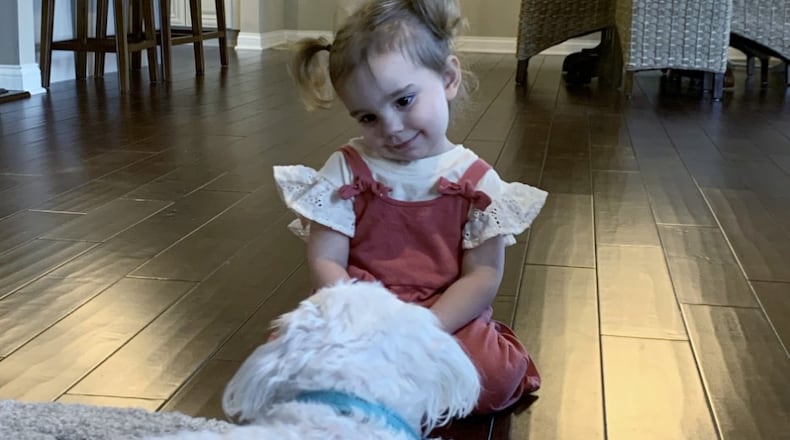Michelle Stern of poochparenting.com puts it like this:
“First, let’s be honest for a second. Young children are downright unpredictable, being sweet and snuggly one minute, and toddling around like a drunk the next. And the volume? Oy. But it’s important to acknowledge two crucial facts: dogs are animals; kids are kids. Neither are human adults with good judgment, and both have a breaking point. It is going to be your job to protect both your dog from the grandkids and to protect the grandkids from your dog.”
We adopted our multiple‑breed rescue dog Lucy when our daughter, Jordan, was almost 7. Lucy was as comfortable with children as with adults. Later, when our friends started bringing over their grandkids, Lucy was as easy around them as she was when she and Jordan were growing up together.
We adopted Teddy, our 11‑year‑old black Lab rescue, when Jordan was a sophomore at the University of Dayton. The Lab was exposed to many adults but not children.
At the time, we didn’t think much about it. But the few interactions he did have with children showed he didn’t like the noise and the extra energy kids brought to his quiet home.
When our nephew, Mike, and his wife, Beth, came to town for a visit a few years ago, Teddy went to his play group.
So there are some steps to follow to make sure everyone gets along when adding grandchildren to your dogs’ lives. It’s up to you to be aware of your dog’s comfort level around the “bundle of joy” joining your family.
First, consider your dog’s personality, age and health. I spoke with Sue Cruse, my daughter’s mother‑in‑law and grandmother of nine. At the time of her first grandchild, Madelyn, joining her family, Harry, her Malti Poo, was 10.
“Harry always had a fun little personality,” Sue said. “He was very happy to meet anyone. At our old house he would wear a trail around the yard where he constantly explored the same path and then he would sit at the end of the driveway to get attention and pets from the neighbors if they were walking by the house. He was originally the kids’ dog but, because of their ages at the time, became pretty much my baby.”
Dog trainers believe it’s important to understand that no matter what the disposition of your dog, it should be subordinate to you and your family members before meeting your new grandchild. This means making sure your dog is following commands and doesn’t show aggressive behavior toward sudden movements.
Sue followed that advice: “One thing I did with Harry was mess with him a little when he was eating or chewing a toy. I wanted to make sure that he would not bite if one of the kids/grandkids would bother them if they were in the middle of eating/chewing. I would lay on the floor by them and sometimes just kind of rub their head, move the bowl or take the chew toy. Harry never bit or growled.
“As far as the grandkids, our family escalated very quickly with two sets of twins, and I always tell Jordan there was a time right before her that it was so calm at our house, a far cry from the current chaos. Because of the fact that we had so many little ones and Harry was getting older, we were all very cognizant of the fact that we had to really watch them interact.”
Finally, trainers say it is important to have a place where your dog can retreat when it’s had enough.
When I first met Harry at Jordan’s bridal shower, the happy pooch greeted all the guests as if it was his party. When he needed a break, the little white dog quietly left the room and rested in Sue and husband John’s screened‑in‑porch. Sue kept a watchful eye on Harry during the festivities.
Harry passed away in March of last year.
“The key is mutual respect and children must be taught how to act with dogs,” Sue said. “They were never allowed to tease, be rough or mean to them. The older grandkids still talk about Harry.”
Karin Spicer is a member of the Dog Writers Association and the Cat Writers Association. She can be reached at spicerkarin@gmail.com.
MORE DETAILS
If your dog seems curious about your new grandkid, this is a good sign. If your dog shows signs of fear or aggression, remove the baby and try again later. These signs include:
- Turning away
- Licking their lips
- Panting even though they’re not hot
- Showing the whites of their eyes
SOURCE: grandparently.com/tools‑and‑tips/introducing
About the Author

